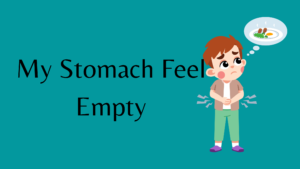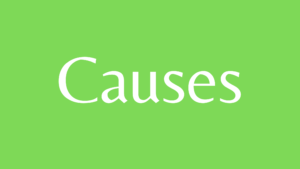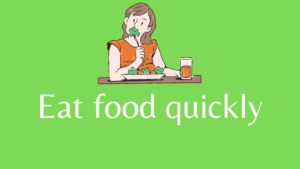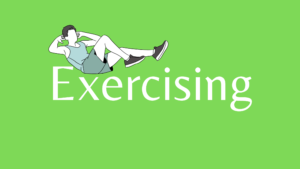
Why Does My Stomach Feel Empty Even Though I Ate? This can be an uncomfortable feeling, but it’s also surprisingly common. Many people experience this sensation, which is known as postprandial emptiness or “empty stomach syndrome.”
Postprandial emptiness can be caused by several factors. It can be due to a disruption in the normal digestive process, such as not chewing food properly or having an underlying medical condition that affects digestion. Eating too quickly and drinking excessive amounts of fluids during meals can also contribute to postprandial emptiness. In some cases, psychological issues like stress and anxiety may play a role in causing this feeling of an empty stomach.
Although it might seem concerning, postprandial emptiness typically isn’t serious and doesn’t require medical treatment unless it’s accompanied by other symptoms like nausea or abdominal pain.
Why does my stomach feel empty even though I ate? (Possible Causes)

Stomach is still empty after eating a meal? If so, chances are that you’re experiencing untimely hunger. While there could be a number of causes behind this phenomenon, understanding why it’s happening will provide valuable insight into the root of the issue and help to devise an effective strategy to resolve it.
First and foremost, it’s important to consider any changes in lifestyle that might have taken place recently. Have you been sleeping later than usual or eating more processed foods? Lifestyle changes can affect hormone levels and metabolic functions which can contribute to feelings of emptiness sooner after eating. Additionally, underlying medical conditions such as diabetes or hypoglycemia can also cause untimely hunger. In some cases, an imbalance in hormones may also be at play.
Composition of the Meal
We’ve all experienced those moments when our stomachs rumble, and we have to decide if it’s time for a snack or not. Unfortunately, it’s a common occurrence that many people experience untimely hunger – but where does this hunger come from? The answer may lie in the composition of the meal.
The way your meals are composed can significantly influence digestion and hunger levels throughout the day. Eating too much or too little of one type of food can lead to an imbalance in satiety hormones. If you’re eating high-fat foods without enough protein and fiber, you may experience increased hunger two to four hours after your meal. On the other hand, eating refined carbohydrates like white bread or sugary cereals without any healthy fats or proteins can cause an energy crash shortly after consumption, leading to increased cravings before your next meal is due.
Stretch receptors
Hunger is an important bodily function that indicates when the body needs nourishment. Though hunger usually appears at regular intervals, sometimes it can be untimely and persistent. To understand why this happens, it’s important to investigate the possible causes behind these feelings of hunger. One potential cause is related to stretch receptors in the stomach, which are sensitive nerve endings that detect when the stomach is full or empty.
Stretch receptors are located in the walls of the digestive tract and send signals to the brain whenever they detect changes in size or tension within the body. When these receptors sense that a person’s stomach has become empty, they can trigger feelings of hunger even if a person has recently eaten a meal and should not be hungry yet. If this happens frequently, it can lead to unneeded snacking throughout the day which could lead to weight gain over time.
Leptin Resistance
Hunger is a natural part of life, but for some individuals, it can be an issue that occurs far too often. The causes behind untimely hunger can range from genetics to lifestyle choices. One possible cause that has been studied recently is leptin resistance.
Leptin is a hormone created by fat cells in the body. Its main function is to signal the brain when one has had enough to eat and should stop consuming food (satiety). In cases of leptin resistance, this signal is impaired or ignored entirely and people may feel like they are constantly hungry even if they have eaten enough food according to their caloric needs. This phenomenon can lead to overeating which further exacerbates the problem since increased weight gain makes it even harder for leptin signals to be accepted by the brain’s receptors.
Stomach feels empty after eating due to Behavioral and lifestyle factors also impact on
Below we explain why your stomach feels empty after eating due to behavioral and lifestyle factors:
Being distracted while eating
Feeling hungry after eating, despite having recently finished a meal, is a common phenomenon experienced by many. This could be due to various behavioral and lifestyle factors that can lead to not feeling satiated after eating. One of the most common causes of this phenomenon is being distracted while eating. People who multitask or focus their attention on something else other than their food are more likely to eat more than they should and not feel full afterward.
Studies have shown that when people are distracted during meals, they tend to eat larger portions without realizing it and often fail to register how much they’ve eaten until it’s too late. Additionally, being distracted from the taste and texture of food can make it harder for people to recognize fullness cues, leading them to eat beyond what their body needs or wants and triggering feelings of hunger again soon after finishing a meal.
Eat food quickly

My stomach feeling empty after eating is a common problem that many people experience, and there are several behavioral and lifestyle factors that can contribute to this issue. Eating too quickly is one of these factors, as it prevents your body from registering fullness and can leave you feeling unsatisfied.
Research has found that eating too quickly increases the amount of food consumed in one sitting, due to the lack of time taken for digestion and satiety signals to be sent to the brain. As such, those who eat quickly are more prone to overeating and feeling unsatisfied afterward. Furthermore, when we eat quickly our bodies don’t have as much time to digest food properly which results in indigestion or bloating and discomfort – all leaving us with an empty stomach.
Fortunately, there are steps you can take if you find yourself eating too quickly.
Feeling depressed
Feeling hungry after eating is a common occurrence that can be caused by a variety of factors. Some of these factors are related to behavior and lifestyle, such as stress. Stress can cause our bodies to produce the hormones cortisol and adrenaline which can trigger hunger even when we don’t need food. This type of hunger is called emotional hunger and it can lead us to overeat or choose unhealthy snacks in an attempt to satisfy ourselves.
It’s important for those feeling stressed out to practice mindful eating habits such as taking breaks throughout the day, drinking plenty of water, and eating slowly so that they recognize when their body has had enough food. Additionally, physical activity and getting enough sleep are essential for managing stress levels. Exercise helps reduce cortisol levels while promoting endorphins which help regulate appetite hormones so that we only eat when we’re truly hungry.
Due to exercising

Why does my stomach feel empty in the morning? behavioral and lifestyle factors can play a big role. If you have been exercising a lot, that could be the culprit of your increased hunger. Exercise is an important part of maintaining good health, but it also increases appetite as fuel is needed for workouts.
While increased hunger after exercise may appear counterintuitive, understanding why this happens can help you manage better while still getting the most out of your physical activities. Your body needs more energy when you are exercising more than usual so that it can perform at its peak level during the workout and recover afterward. As such, when you exercise regularly or vigorously your metabolic rate increases which in turn leads to increased hunger.
Feeling hungry due to lack of sleep
Feeling hungry after eating can be a frustrating and confusing experience. The feeling of hunger may seem to come out of nowhere, even sometimes right after a meal. It turns out there are several behavioral and lifestyle factors that can contribute to feeling hungry after eating, one such factor being a lack of sleep.
When you don’t get enough rest, your body may misinterpret that as an indication it needs more fuel than usual. This leads to an increase in appetite during the day, causing you to feel hungrier even when you’ve already eaten enough food for the day. Not only does not getting enough sleep make you physically hungrier but it also affects your ability to control cravings, leading many individuals towards unhealthy snack options or excessive amounts of food.
Due to not eating enough food
Why Does My Stomach Feel Empty Even Though I Ate? Feeling hungry after eating is a common phenomenon that can be caused by various lifestyle and behavioral factors. Not eating enough food can leave you feeling unsatisfied, causing a state of hunger shortly after a meal. Eating too little can lead to feelings of hunger, as the body has not been provided with enough energy and nutrients to remain satiated for long periods.
Certain behaviors, such as skipping meals or snacking on unhealthy foods throughout the day can contribute to frequent hunger pangs after meals. Additionally, some individuals may be prone to over-consuming certain types of food, like carbohydrates or sugar-based snacks which provide an initial rush of energy but quickly wear off leading to feelings of hunger again soon afterward.
Stomach feels empty after due to insulin resistance and high blood sugar
Feeling hungry after eating is an all-too-common occurrence. It is often attributed to not eating enough or not getting enough nutrition, but it could also be due to behavioral and lifestyle factors. High blood sugar and insulin resistance are two such issues that can cause hunger pangs even after a full meal.
When the body’s cells become resistant to the effects of insulin, glucose levels in the bloodstream remain higher than usual. This means that even though you’ve just eaten, your body may still feel like it needs more calories than it has taken in. As a result, you experience hunger pangs shortly after finishing your meal. In addition to this, high blood sugar can make you feel tired and lethargic which can also lead to hunger cravings as your body looks for more energy sources.
Frequently Ask Questions
Why does my stomach feel empty even though I ate?
Do you feel like your stomach is empty even after eating? This can be a common occurrence for many people, and there are several reasons why your stomach may feel empty even though you’ve just eaten. The type of food you consume, as well as stress levels and poor digestive health, can all play a role in this sensation.
Depression is caused to the stomach feeling empty.
Depression is a serious mental health disorder that affects millions of people. It can cause debilitating symptoms, including feeling empty and flat, which can lead to severe emotional distress and suffering. Research has shown that depression is caused by a combination of biological, psychological, and social factors.
Behavioral and lifestyle factors also impact and Stomach feel empty.
Stomach feeling empty can also be caused by behavioral and lifestyle factors. For example, poor sleep habits, stress, excessive alcohol consumption, lack of physical activity and certain medications can all affect how our body processes food and empties our stomachs.
What are the symptoms of gastroparesis?
Nausea and vomiting are two of the most common symptoms of gastroparesis But there are some other symptoms of gastroparesis including Abdominal bloating, Abdominal pain, Lack of appetite, Weight loss, GERD (gastroesophageal reflux disease), Blood sugar fluctuations (in diabetics), Early feeling of fullness during a meal and regurgitation of undigested food.
Stomach pain that feels like hunger but isn’t
An ulcer can cause symptoms that feel like hunger pangs but are not related to the need for food. Other symptoms of an ulcer can include burning or gnawing pain in the upper abdomen, nausea, vomiting, and loss of appetite. If you’re experiencing these symptoms, it’s important to speak with a healthcare provider for an accurate diagnosis and appropriate treatment.
Thanks for reading.